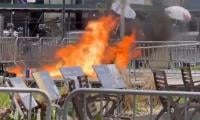ISLAMABAD: Power Division has withdrawn its summary draft carrying two options seeking end to utilisation of minimum 66 percent supply of imported gas by RLNG power plants.
According to the official memorandum of power division, written by Section Officer Syed Mateen Ahmad, the current summary circulated on October 24, 2019 among stakeholders prior to pitching before the ECC has been withdrawn.
The Power Division had prepared summary draft for ECC and circulated among the stakeholders such as Petroleum Division (PSO, Sui Southern and Sui Northern), Nepra, Planning Commission, Finance Ministry, but now under new scenario, because of severe opposition by PSO, Sui Northern and Sui Southern, Power Division has withdrawn its own summary.
However, the official memorandum also mentions that a summary will be submitted shortly as it is being updated on few additional facts.
It is pertinent to mention that Power Division earlier marketed its summary among the stakeholders with two options and under Option-A it wanted the withdrawal of existing minimum guaranteed off-take of 66 percent on annual basis. Accordingly, the annual production plan shall continue to be provided without any minimum guaranteed off-take of 66 percent and the same shall be reflected in the revised PPA (power purchase agreement), GSA (gas sales agreement) and IA (Implementation Agreement) to be executed for the purpose of privatization of NPPMCL (RLNG based power plants at Haveli Bahadur Shah and Balloki).
Under Option-B, Power Division pleaded that the government of Pakistan is contractually bound to adhere to PSO agreement with Qatar Gas up to the year 2025, saying it wanted the government to withdraw the existing minimum guaranteed off-take of 66 percent immediately after the review period of PSO agreement with Qatar Gas in 2025 and till 2025 one of the following option shall be incorporated in the revised PPA (Power Purchase Agreement), GSA (Gas Sales Agreement) and IA (Implementation Agreement) to be offered for privatization and to ensure that SNGPL to follow NPCC’s (National Power Control
Center) instruction pertaining to diversion of un-utilized RLNG and such instruction shall take precedence over another RLNG supply arrangement of SNGPL with any power sector project operating on RLNG on as and when available basis.
Power Division also said: ‘Till 2025, the difference of the RLNG requirement for these two power plants as per economic merit order principle and the RLNG requirement for minimum 66 percent guaranteed off-take should be utilized by other sectors of economy (on OGRA’s notified price of RLNG) and slash all sold to the spot market.’ And it also argued saying additional cumulative impact of approximately Rs471 billion on the basket price arising due to the guaranteed off-take of 66 percent up to 2025 on account of dispatch of these power plants beyond the principle of economic merit order shall be allowed as subsidy to power sector consumers.
Pakistan State Oil (PSO) has already scuttled the move of Power Division seeking end to utilization by RLNG power plants minimum 66 percent supply of imported gas on annual basis guaranteed in the deal saying it is simply not acceptable as it will lead to huge financial losses to the national exchequer and public sector companies involved in LNG supply chain.
PSO says LNG Sales Purchase Agreement (SPA) with Qatar Gas does not have unilateral termination provisions and in case of buyer’s default of not taking deliveries of contracted volumes, it will lead to Take or Pay penalties, which would culminate into material breach of the contract.
‘In such case even if the agreement is terminated by Qatar Gas, certain liabilities including Take or Pay will prevail for the remaining term of the agreement meaning by that till December 2031. On the prevailing prices, the estimated account of take or pay liability would be around US $17.5 billion for the total contracted volumes from January 2020 till the expiry of the contract, which would be far greater than the privatization proceeds of these power plants.
Mentioning about the Option-A, PSO in its letter refused to support this proposal of Power Division withdrawing existing minimum guaranteed off-take of 66 percent on annual basis pleading that PPA, GSA and IA cannot be revised in isolation without amending the obligations undertaken in long term take or pay commitments in the upstream contracts including SPA between PSO and Qatar Gas. As the long term supply agreements were not entered into for specifically providing fuel to the power plants, removing such guaranteed off-take conditions will badly expose all the companies in LNG supply chain, including PSO.
This would have huge financial implications, leading to irreparable loss to national exchequer, unless new customers of equivalent volumes of contracted beforehand under fir take or pay guarantees for utilizing these long terms contracted volumes of LNG at notified price of RLNG so that payments obligations to international suppliers are met.
About the Option-B of Power Division, PSO says it mentions that the government is contractually bound to adhere to PSO agreement with Qatar Qas up to the year 2025. This is not factually correct as SPA is valid for 15 years and will expire in December 2031. There is a price review clause after 10th anniversary which make year 2026 as the year for price review. However, price review is not an exit clause rather a price re-opener to review the price and market conditions of long terms contracts prevailing at the time and accordingly make price adjustment if required, which could be upward or downward revision of prices.
More importantly, the state owned gas companies in their written response have also said that they are of the view that the proposed summary for ECC must be withdrawn by Power Division keeping in view the contractual arrangements and obligations of the parties in LNG and RLNG supply chain that colossal financial losses to the national exchequer could be avoided.
President called the Senate meeting under Article 54 of the Constitution
Crowd’s long wait due to persistent rain backed by heavy showers came to an end just for two deliveries with New...
Chief Justice Justice Faez Isa said amendments to the High Court Rules were necessary before appointment of judges
A division bench of the PHC comprising Justice SM Attique Shah and Justice Syed Arshad Ali heard the petition in which...
According to the Senate Secretariat, Gilani emphasized better coordination between the two Houses







